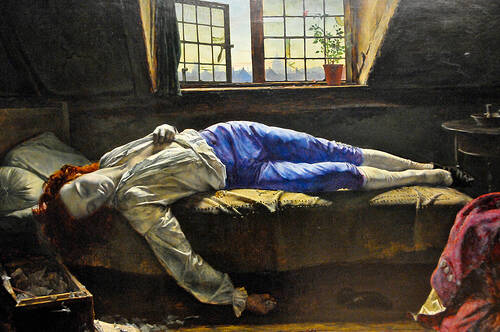The details of the dreams vary, but not their theme. It’s always anxiety. I’m again a college freshman, and I’m signed up for Math 101. Trouble is, it’s finals week, and I didn’t know that I was enrolled in the course. I figure that I might still pass it—in real life I had been exempted from it—if I can only find out where the final is being held. I wander the campus, asking, but no one knows.
I’m again in a high school play. My part is small, and I don’t go on stage until the second act. I play a Pie Judge at the county fair, who urges the heroine and her sister to take their pies to the State Fair. Trouble is, the curtain has risen, and I’ve only just learned that I’m in the play. I reckon that I can act the part, learn the lines before Act II arrives, if only I could find the script. But all the actors have meticulously followed the instructions of the director. They are “off script,” and there are none to be found back stage.
I’m a priest, in the middle of Mass, but the missal in front of me is new. I have never seen it before this moment, and I can’t find the proper prayers. I flip, more and more frenetically, through its unknown pages, while the congregation waits.
There’s a worse version. I’m ready for Mass, but, as I check to see that my chasuble is hanging properly, I realize that I have nothing on under it. Not a sacred stitch. What am I to do? Mass is starting. Move very, very slowly?
The details of the dreams vary, but never the theme. It’s always anxiety. We worry that, at the worst possible moment, we won’t be ready. Life itself will find us wanting, and everyone will know it.
We celebrate the Solemnity of All the Saints. It’s a good time to remember that there is really only one thing about which we should be anxious. Are we fulfilling the purpose of our lives, of our very existence? Are we becoming saints? In the end—at the end—that’s the one thing that matters: not to be found wanting before God. To become a saint is the reason we were created. We come from utter truth, shear goodness, absolute beauty, and all that we do on earth, all that truly matters, is to return our lives, sanctified in their seasons, to their source, the Father of Our Lord Jesus Christ.
Anxiety and sanctity are diametric. Most of what makes us anxious has nothing to do with holiness. It’s woven from the mundane, the personal and the petty. It passes. We need to remember that. When holiness is the focus of our life, anxiety begins to fade.
What does it mean to pursue holiness? To become a saint? It’s so simple. Do what life hands you today, with as much peace and joy as your prayers can muster. Your lesser self will suggest that these daily tasks are trivial and unacknowledged. The Spirit, who dwells within you, will insist that God and the angels watch. They observe what will become eternal in your labors. You are anxious over that which will pass.
Still unsure if your anxiety is well placed? Write down the worries of your day in a column. In an adjoining column, write out the Beatitudes. Now, compare those two lists. Either your worries will become trivial, or you will know that they deserve all that you can give.
Be anxious not to be found wanting before the throne of God. Time is not exhaustible. It will end for you as it does for all. Nonetheless, life is now crafting something eternal from these temporal tasks: your sanctified soul.
Revelation 7: 2-4, 9-14 1 John 3: 1-3 Matthew 5: 1-12a









Sandi,
As one who preaches almost every day, I am aware that homilies never say all that could be said. I could go through almost every sentence, which I write, and add, “But also, or, and on the other hand.” But then folk would rightly complain about the length of my sermons.
You do employ a tired trope, which needs to be challenged: that celibates don’t know about the real world and its worries. Yes, religious life does shield one from much, though I’ve experienced most of the financial troubles you list. (For years, I was paying my own way in academia.) The week I wrote this piece, I had sat with a mother who was burying her son, saying myself that no one else knew her pain. I’ve buried my own mother this past year. Lived as the Church intends, celibacy plunges one into the sorrows and worries of others. I don’t know of a day in which I’m not asked to share them, to make them partially my own.
Humans often feel that no one has troubles like they do, but I don’t think that this notion is of the Spirit. There is little purpose here in listing the troubles and sorrows that come with celibacy. We don’t win anything by claiming the most worries.
I stand by my original point, which is that there are worries we should own and worries we should let go, and that the Beatitudes can help us to discern between the two. You’re right that worries come with the human condition. What’s surprising is that you would think that the one you list might not be worthy of your attention. This note comes with a prayer that the Lord be with you in your worries.